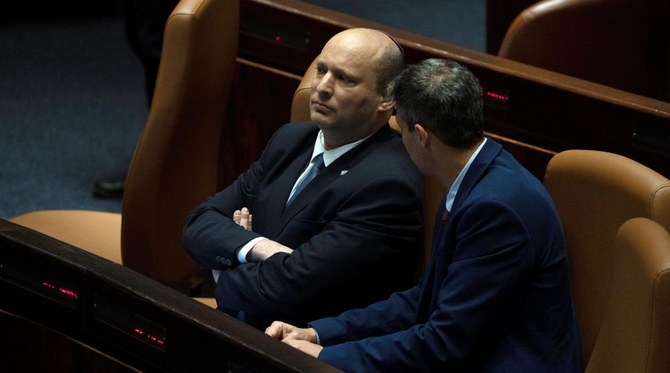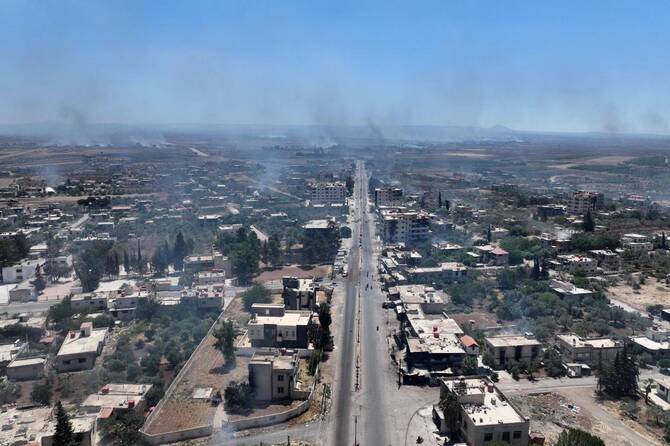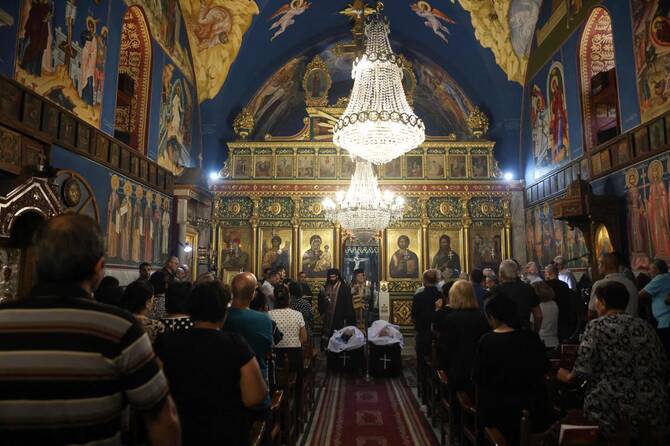RAMALLAH: Israeli Prime Minister Naftali Bennett’s statements rejecting outside interference in the management of the affairs of Al-Aqsa Mosque on Sunday sparked outrage among Jordanians and Palestinians.
The position was seen as a denial of the 1994 Jordanian-Israeli peace treaty that gave Jordan a role in managing and supervising Islamic and Christian sanctities in Jerusalem.
“We reject any foreign interference,” declared Bennett as he retracted agreements between Israel and Jordan on managing Al-Aqsa Mosque’s compound and preventing incursions by Jewish settlers into its courtyards.
Bennett said at the beginning of a Cabinet meeting on Sunday that “decisions regarding Al-Aqsa Mosque and Jerusalem will be taken by the Israeli government.”
He also claimed Israel would continue to maintain respectful treatment toward people of all religions in Jerusalem.
The Palestine Committee of the Jordanian Parliament denounced the prime minister’s statements regarding Israel’s sovereignty over Al-Aqsa as “irresponsible” on Sunday, and it called on Bennett “not to test the patience of two billion Muslims.”
The committee condemned Bennett’s statement as working to ignite the region in religious conflict, calling it a coup against the historic reality of Al-Aqsa Mosque and Jerusalem.
Jordanian MP Mohammed Al-Zahrawi called Israel a colonial occupying power that practices terrorism and criminality against Palestinian people, and which lacks religious, historical or legal legitimacy in Jerusalem.
The Palestine Committee reiterated Jordan’s rejection of the temporal and spatial division of Al-Aqsa, and stressed Jerusalem will remain the capital of Palestine.
Jordanian and Israeli officials had agreed to meet after Ramadan to discuss arrangements around Al-Aqsa Mosque, but the Islamic Awqaf in Jerusalem told Arab News that “no structures have taken place regarding such meetings.”
Azzam Al-Khatib, the director of the Islamic Awqaf, told Arab News he had not been informed about any meetings or visits.
Foreign tourism visits to Al-Aqsa have been agreed upon between Jordan and Israel, but without permitting religious rituals, as many Jewish settlers have attempted on numerous occasions.
As part of the Israeli-Jordanian peace treaty, it was agreed Jordan would retain its unique role in the mosque complex, with each party providing access to places of religious and historical interest. The two parties also agreed to work together to strengthen relations between the three monotheistic religions, to work for religious understanding, moral commitment, freedom of worship, tolerance and peace.
Palestinians, meanwhile, are demanding Israeli authorities remove a model of a temple, located at the entrance to the Mughrabi Gate, through which extremist Jewish settlers enter the compound, on the basis that it serves as a reminder of their goal to replace the Dome of the Rock.
“Bennett is wrong, and there is an agreement between Israel and Jordan, which gives Jordan a unique role in Al-Aqsa,” prominent Israeli peace activist Gershon Basking told Arab News.
He added the Jordanian Awqaf should be strengthened, enlarged, and empowered, and proper coordination between the Awqaf and the Israeli police should enable a situation whereby the police do not need to enter the compound.
Non-provocative visits by non-Muslims should be allowed and even encouraged, said Baskin, adding that the Awqaf members should facilitate these visits and use them to talk about Islam and the holy places.
Bennett’s statements came in response to the head of the United List, Mansour Abbas, who said on May 7 that his party’s position was dictated by understandings between Israel and Jordan regarding the holy sites in Jerusalem.
The United List had announced earlier on Sunday that its members would not participate in the vote on a bill proposed by the Likud party to dissolve the Knesset next Wednesday.
According to Israeli media, the fear among right-wing parties in Israel is that the Joint List will decide to vote against the dissolution of the Knesset and drop the proposal, making it impossible to present another such proposal for six months.






















